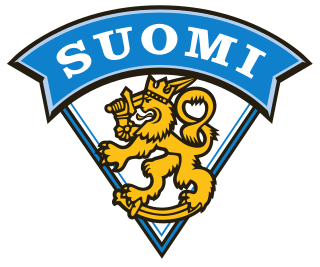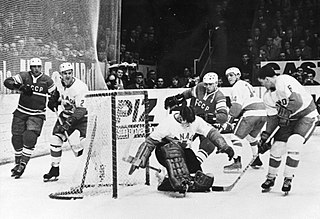
The Ice Hockey World Championships are an annual international men's ice hockey tournament organized by the International Ice Hockey Federation (IIHF). First officially held at the 1920 Summer Olympics, it is the sport's highest profile annual international tournament. The IIHF was created in 1908 while the European Championships, the precursor to the World Championships, were first held in 1910. The tournament held at the 1920 Summer Olympics is recognized as the first Ice Hockey World Championship. From 1920 to 1968, the Olympic hockey tournament was also considered the World Championship for that year.

The men's ice hockey tournament at the 1976 Winter Olympics in Innsbruck, Austria, was the 13th Olympic Championship. The Soviet Union won its fifth gold medal. Games were held at the Olympiahalle Innsbruck.

The Finnish men's national ice hockey team, nicknamed Leijonat / Lejonen, is governed by the Finnish Ice Hockey Association. Finland is one of the most successful national ice hockey teams in the world and a member of the so-called "Big Six", the unofficial group of the six strongest men's ice hockey nations, along with Canada, the United States, the Czech Republic, Russia, and Sweden.

The men's ice hockey tournament at the 1980 Winter Olympics in Lake Placid, United States, was the 14th Olympic Championship. Twelve teams competed in the tournament, which was held from February 12 to 24, 1980. The United States won its second gold medal, including a win over the heavily favored Soviet Union that became known as the "Miracle on Ice".Games were held at the Olympic Fieldhouse (8,000) and the Olympic Arena (2,500).
The men's ice hockey tournament at the 1960 Winter Olympics in Squaw Valley, United States, was the ninth Olympic Championship, also serving as the 27th World Championships and the 38th European Championships. The United States won its first Olympic gold medal and second World Championship. Canada, represented for the second time by the Kitchener-Waterloo Dutchmen, won the silver and Canada's ninth consecutive Olympic ice hockey medal. The Soviet Union won the bronze medal and its sixth European Championship. The tournament was held at the Blyth Arena, under the supervision of George Dudley on behalf of the International Ice Hockey Federation.

The men's ice hockey tournament at the 1968 Winter Olympics held in Grenoble, France, was the 11th Olympic Championship, also serving as the 35th World Championships and the 46th European Championships. This was the last Olympic tournament to include the World and European titles. Games were held at the Palais des Sports. The Soviet Union won their third Olympic gold medal, eighth World Championship and twelfth European Championship. Czechoslovakia won the silver, followed by Canada taking the bronze.

The men's ice hockey tournament at the 1984 Winter Olympics in Sarajevo, Yugoslavia, was the 15th Olympic Championship. The Soviet Union won its sixth gold medal. Games were held mostly in the arena portion of the Olympic Hall Zetra, with some played in the arena portion of the Skenderija Olympic Hall.

The men's ice hockey tournament at the 1956 Winter Olympics in Cortina d'Ampezzo, Italy, was the eighth Olympic Championship, also serving as the 23rd World Championships and the 34th European Championships. The tournament was held at the Olympic Ice Stadium and the Apollonio Stadium.
The men's ice hockey tournament at the 1964 Winter Olympics in Innsbruck, Austria, was the tenth Olympic Championship, also serving as the 31st World Championships and the 42nd European Championships. The games were held at the Olympiahalle Innsbruck.

The men's ice hockey tournament at the 1972 Winter Olympics in Sapporo, Japan, was the 12th Olympic Championship. Games were held at the Makomanai Ice Arena and at the Tsukisamu Indoor Skating Rink. The Soviet Union won its fourth gold medal. The United States won the silver, while Czechoslovakia won the bronze. Canada did not send a team to the event for the first time since ice hockey was first competed at the Olympics in 1920, instead competing with and defeating the Soviets in a competition later that year known as the Summit Series. Canada would not send a men's hockey team to the Olympics until 1980.

Ice hockey tournaments have been staged at the Olympic Games since 1920. The men's tournament was introduced at the 1920 Summer Olympics and was transferred permanently to the Winter Olympic Games program in 1924, in France. The women's tournament was first held at the 1998 Winter Olympics.

Alpine Skiing at the 1988 Winter Olympics consisted of ten alpine skiing events, held February 15–27 at Nakiska on Mount Allan, a new ski area west of Calgary.
The IIHF World Junior Championship (WJC), or simply the "World Juniors" in ice hockey circles, is an annual event organized by the International Ice Hockey Federation (IIHF) for national under-20 ice hockey teams from around the world. It is traditionally held in late December, ending in early January. The tournament usually attracts the top hockey players in this age category.

The Punch-up in Piestany was a bench-clearing brawl between Canada and the Soviet Union during the final game of the 1987 World Junior Ice Hockey Championships in Piešťany, Czechoslovakia on January 4, 1987. The incident resulted in the ejection of both teams, and while the Soviets had already been eliminated from medal contention, the disqualification cost Canada a medal – potentially the gold. The brawl is famous for officials having turned off the arena lights in a desperate attempt to end the 20-minute melee. Much of the blame was placed on Norwegian referee Hans Rønning, who had been selected for the game based on his perceived neutrality rather than experience.
The 1971 Ice Hockey World Championships was the 38th edition of the Ice Hockey World Championships, which also doubled as the 49th European ice hockey championships. The Pool A, Pool B and Pool C tournaments were hosted by the following nations:
The 1970 Ice Hockey World Championships was the 37th edition of the Ice Hockey World Championships. 21 nations participated in three different divisions or pools:
The 1969 Ice Hockey World Championships was the 36th edition of the Ice Hockey World Championships, which also doubled as the 47th European ice hockey championships. For the first time the Pool A, B and C tournaments were hosted by different nations:

The 1967 Ice Hockey World Championships was the 34th edition of the Ice Hockey World Championships. The tournament was held in Vienna, Austria from March 18 to March 29, 1967. The Soviet Union won the tournament for the fifth straight year, Sweden won the silver medal, and Canada claimed the bronze medal.

In men's international ice hockey, the Big Six is a group comprising the six national teams that have dominated play throughout the history of international ice hockey, especially since the 1950s. It is composed of the North American countries of Canada and the United States and four European countries: Czech Republic, Finland, Russia, and Sweden. During the Cold War and for two years afterwards, the Soviet Union/CIS and Czechoslovakia held the places of Russia and the Czech Republic, respectively, within the group. The four European members are sometimes referred to as the "European Big Four" or "Big Four", especially to distinguish them from the North American teams.
A number of notable controversies and concerns associated with the 1988 Winter Olympics in Calgary, Alberta, Canada, emerged which were the subject of public debate and media commentary.













